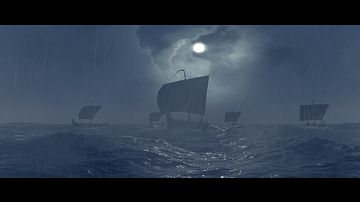Search
Search Results

Definition
Pyotr Ilyich Tchaikovsky
Pyotr Ilyich Tchaikovsky (1840-1893) was a Russian composer most famous for his symphonies, the ballets Swan Lake, The Sleeping Beauty, and The Nutcracker, and the operas Eugene Onegin and The Queen of Spades. A composer of innovative and...

Definition
Michael IV the Paphlagonian
Michael IV the Paphlagonian was Byzantine emperor from 1034 to 1041 CE. He had an affair with Empress Zoe, then married her and was crowned emperor after the death of her first husband, Romanos III. He ran a competent regime that kept the...

Definition
Bardr mac Imair
Bardr mac Imair (c. 873-881 CE, also known as Barid mac Imair, Barith, Baraid) was a Viking king of Dublin, son of the Viking king Imair (Imar, Ivan) who founded the Ui Imair Dynasty in Ireland. Bardr became king in Dublin after Imair's death...

Definition
Isaac I Komnenos
Isaac I Komnenos was the Byzantine emperor from 1057 to 1059 CE. Although his reign was brief, he was known for being a capable and militarily astute general and emperor. As the first emperor to lead troops himself in battle in over 30 years...

Definition
Geghard
Geghard (Armenian: Geghardavank or "monastery of the spear") is a medieval monastery located in Armenia's Kotayk province, deep within the Azat Valley, which was built directly out of an adjacent mountain. Geghard is renown throughout Armenia...

Definition
Black Death
The Black Death was a plague pandemic that devastated medieval Europe from 1347 to 1352. The Black Death killed an estimated 25-30 million people. The disease originated in central Asia and was taken to the Crimea by Mongol warriors and traders...

Definition
Poseidon
Poseidon was the Greek god of the sea and rivers, creator of storms and floods, and the bringer of earthquakes and destruction. He was perhaps the most disruptive of all the ancient gods but he was not always a negative force. He was a protector...

Definition
Cyclops (Creature)
A cyclops (meaning 'circle-eyed') is a one-eyed giant first appearing in the mythology of ancient Greece. The Greeks believed that there was an entire race of cyclopes who lived in a faraway land without law and order. Homer, in his Iliad...

Definition
German-Soviet War - WWII's Bloodiest Front
The German-Soviet War, known in the USSR and today's Russia as the Great Patriotic War or, in Western Europe, as the Eastern Front of the Second World War (1939-45), began in June 1941 with Operation Barbarossa and ended in Germany's total...

Definition
Kristallnacht - The Infamous Nazi Attack on Jewish People
The Kristallnacht (Reichkristallnacht, 'Night of Broken Glass', or November Pogrom) was an attack on Jews and Jewish property across Germany and Austria on 9-10 November 1938. Orchestrated as part of a systematic and escalating persecution...